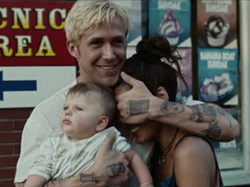
Director: Derek Cianfrance
Starring: Ryan Gosling, Eva Mendes, Ben Mendelsohn, Bradley Cooper, Rose Byrne, Ray Liotta, Emory Cohen and Dane DeHaan
Review Written By: Michael Dalton (Prime Minister)
"If you ride like lighting, you're going to crash like thunder"
The Place Beyond the Pines is ambitious in its structure, being essentially a trilogy in one film. It is an approach and a set-up I greatly appreciated, found unique and inspirational. While many films in the past have passed the narrative baton to another character during the film, Place Beyond the Pines does so twice. Each time the story shifts, it never feels jarring and instead like a smooth, natural transition and progression. Although in its second shift, there is a fifteen-year time jump that is perhaps better suited for a novel rather than a film. The actors present in act two do not appear to have visibly aged in the fifteen-year gap between that and act three. While I’d rather see no ageing as opposed to bad, goofy ageing make-up (Such as the kind seen in the final scene of Harry Potter and the Deathly Hallows: Part Two) it is still a visible and distracting flaw. The film due to its thematic weight and emotional complexity feels novelistic however always cinematic, yet it is in this one element where the story feels perhaps not at home on the big screen.
The first act is where the film is undoubtedly at its strongest. The film opens with a tracking shot introducing Gosling’s character, which is an early contender for shot of the year. The way the camera follows him as he leaves his trailer, puts on his costume, gets on his motorbike and enters the cage, with no visible cut indicating a change from Gosling to a stuntman for the death defying stunt, is technically inspirational yet serves a substantial narrative purpose. Derek Cianfrance utilizes tracking shots frequently throughout the film, most thrillingly during the film’s motorcycle chases. A commendable achievement in craft, yet never feeling like a stylistic gimmick. In the first act of this film Cianfrance manages to be visually dynamic,without the film seeming like an exercise in style and never overshadowing the story or the performances.
As Luke Glanton, Ryan Gosling gives what may be my favourite performance of his. A man who wants to do the right thing but doesn’t know how, Gosling’s Glanton is a tragic antihero whose presence hangs over the entire film, even and especially when he’s not present. As in Drive, Gosling’s performance excels in the smaller and subtler moments. The scene where Glanton gives his son ice cream for the first time and shows him his motorbike is a scene that brings a smile of warmth to your face due to Gosling’s naturalism and earnestness. However it is a scene that in retrospect carries great poignancy and tragedy. Gosling manages to appear both comforting and dangerous, with him able to terrify you one second with a sudden outburst of violence, and endear you to him the next. The way in which his voice gets higher pitched when shouting instructions during the bank robberies, intelligently indicates a man who is struggling to be the man he thinks he needs to be, to become the man he wants to be. Additionally, one of the film’s finer moments may be a close-up of Gosling’s face, tears rolling down it as he is reduced to a spectator at his son’s christening, with the Our Father being recited in the background. Completely believable and relatable, yet with a classic movie star charisma and presence (As noted in my Gangster Squad review, Gosling feels like an actor who would be right at home in the classic era of Hollywood) Gosling continues to demonstrate in this film why he is one of the finest actors working today.
As the focus switches from Ryan Gosling to Bradley Cooper, the film loses something. The film’s first act is so powerful, so emotional and so good, that the rest of the film can’t quite stay at that level. To use my favourite quote from the film, it starts off riding like lightning and it would be easy, cute, though unfair to say it proceeds to crash like thunder. The film becomes much more standard in its second act, visually and in terms of the narrative. While Cooper continues to demonstrate how he is more than a pretty boy and Ray Liotta is perfect as the dirty cop, the corruption in the police force storyline seems like well trodden ground and lacks the same excitement, emotion, uniqueness and dynamism of the first act. While I was still totally engaged and engrossed, the film’s second act is where I found the film to be at its weakest.
When the film jumps fifteen years to its third act, this is where many claim the film is at its weakest. However this final movement is what the film is truly about, as the legacy and sins of the father return to haunt the sons. Dane DeHaan (Chronicle) has trouble teen nailed down, with him in a sense playing his character from Chronicle but without the superpowers. The film threatens to go into Chronicle territory, with it looking set to drive down the revenge road. However the film then does something, which may be anti-climatic by mainstream standards, yet in keeping with the film’s realistic approach to that point and maintaining its emotional complexity. DeHaan gives a superb performance and continues to hint at future greatness. Emory Cohen is equally effective as the child of Cooper’s character, with the tension and chemistry between him and DeHaan lighting up the screen and lending the film an air of impending danger. While me being of a similar age to the principal characters in this movement may explain my closer affection to it than others, in regards to the story the film is telling and the themes it is portraying, the third act IS the movie.
Ultimately this third act didn’t emotionally punch me the way I wanted it to and the way it intended to. Whilst I was fully engrossed and was not bored for a second of the film’s two hour and twenty minute running time, aside from the first act, it didn’t affect me the way I expected it would. However I fully expect this to be a film that will improve upon a second viewing and two days after seeing it, the film won’t leave my mind and improves the more I think about it. With its ideas of fathers and sons, hero worship, consequences, fate and legacy, Pines may be the most thought-provoking film I have seen so far this year. Reading discussions about it online, the film has revealed itself to be open to many interpretations and gives birth to many diverse opinions regarding the actions and feelings of the characters.
Due to a standard second act and an initially emotionally lacking third act, for me personally, The Place Beyond the Pines didn’t reach the greatness I expected it to on a first viewing. However due to its thematic density and emotional complexity, as well as the filmmaking craft on display, I know this is a film that will stay with me and one I will return to again and again. Some may find it overly long, dull and the final act time-jump goofy (With many of my generation destined to check out at the end of the first act) however this film had a personal resonance that transcended its flaws.

Rating: 8/10
By Movie Parliament Prime Minister,
Michael Dalton
Disagree with this review? Give us your thoughts in the comments below.
 RSS Feed
RSS Feed
